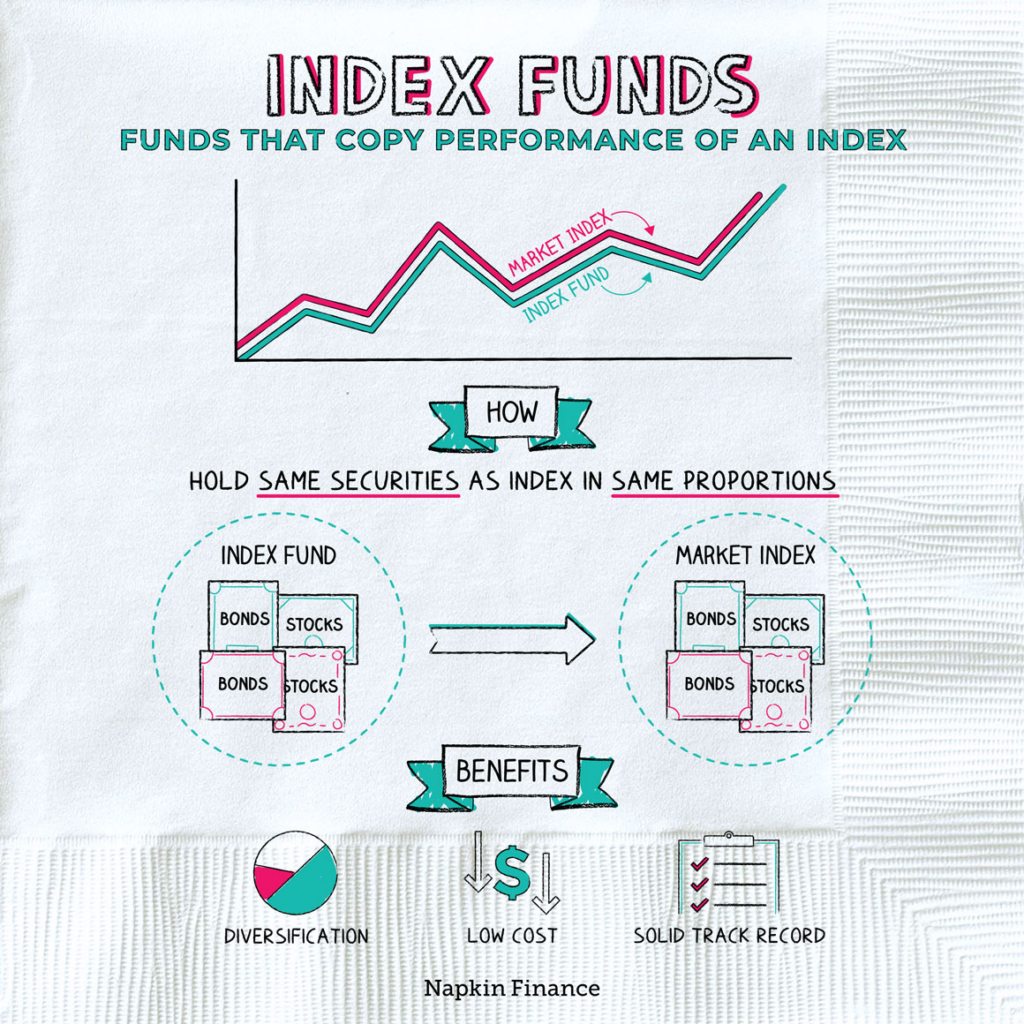Investors in India have a plethora of investment options to choose from. Stocks, bonds and mutual funds are the most common investment options. However, another very popular investment vehicle is the index fund.
Whether you’re a seasoned investor or just starting your investing journey, index funds may add good value to your portfolio. Read on to find out what index funds are, what traits make them attractive to investors, how you can invest in them, and more!

You will Learn About:
What is an index?
Before we explain what an index fund is, it’s important to understand what an index is. In simpler terms, an index is a portfolio of certain stocks. The proportion of each stock in such a portfolio is calculated based on factors such as market cap, revenue, price, etc. The point of an index is to act as a proxy for the collection of stocks that make it up: the value of the index reflects the aggregate value of its constituent stocks.
The most useful kind of index is a market index, which comprises important stocks that can significantly affect the stock market as a whole. Some examples of market indexes in the US are the S&P 500, the Dow Jones Industrial Average, and the Nasdaq Composite Index. The two main market indexes in India are the NSE Nifty and the BSE Sensex.
Some indexes also track specific sectors, such as IT, FMCG, banking, automobiles, pharmaceuticals, etc.
What is an index fund?
An index fund constitutes a fund whose portfolio is put together in such a way as to track the components of some index. In other words, an index fund is an actual fund with a portfolio that mimics the performance of a certain index. Thus, if the market as a whole performs well, market indexes and index funds should also rise in value. The same is true for specific sectors and their corresponding indices and index funds.
Index funds may be mutual funds or exchange-traded funds (ETFs). While ETFs can be traded intraday like normal stocks, mutual funds can typically only be sold at the end of each day. There might also be differences in the fees and tax implications of these two types of index funds.
How does an index fund work?
Typically, an index fund follows a benchmark index. When you invest your money in index funds, the fund allocates the money to different companies and sectors, thereby reducing your risk and research efforts.

Who should invest in an index fund?
Index funds have several traits that make them a good investment choice. In general, ETFs based on market indexes are relatively inexpensive (in terms of their fees) and can deliver consistent and significant returns over time.
Moreover, investors can avoid the hassle and risk of researching and picking individual stocks by investing in index funds. These characteristics also make index funds a good choice for people looking to save for retirement. For instance, the NSE Nifty has provided annualised returns of around 11% over 27 yrs, which is equivalent to an absolute return of 1,700%! This can be treated as an attractive rate of return.
If you have a large risk appetite and are looking for extremely high returns, then index funds might not be for you.
Factors to consider when investing in index funds
While index funds are a good bet for most investors, below are a few factors you must consider before investing –
- Expense ratio
The expense ratio is the annual fee charged by index fund managers to keep the fund in sync with the underlying index. It typically varies from 0.10% to around 2%, although it can be as low as 0.06%. The lower the expense ratio, the more returns you can enjoy.
- Level of diversification
In general, diversification is considered to be a risk-mitigating measure in investing. However, it can yield lower returns than a more risky, concentrated approach.
Explore various index funds to determine how many companies and/or sectors they are invested in so that you can gauge if their level of diversification aligns with your investing goals.
- Returns over various periods
In addition to the average returns over time, you should also look at the returns over various periods, such as 3 yrs, 5 yrs, and 10 yrs. This can help you gauge the overall performance and also ensure you can handle the volatility.
Advantages of an index fund
There are several important advantages to investing in index funds. Some of them are:
- Ease of management
It’s easier for individual investors to keep track of a single index fund rather than a large number of different stocks.
- Relatively low fees
Because index funds are “passively” managed (i.e., fund managers only have to follow the underlying index rather than figure out a strategy on their own), their fees are relatively low.
- Minimisation of the human bias
Index funds are built based on an index, which itself is based on specific rules. Thus, the role of human biases and oversights is minimised when investing in them.
How to invest in an index fund in India?
Many investment and brokerage platforms allow you to invest in index funds. Typically, you must create a demat account, complete KYC formalities, and connect your bank account. And that’s it! You are ready to invest.
Tax on index funds
When the constituent stocks or units of an index fund are “redeemed” (i.e., sold), the gains obtained are subject to capital gains tax. There are two kinds:
- Long-term capital gains (LTCG)
These are capital gains obtained by redeeming units held for more than 12 months. The associated tax rate is 10%.
- Short-term capital gains (STCG)
These are capital gains obtained by redeeming units held for less than 12 months. The associated tax rate is 15%.
Conclusion
Index funds constitute a portfolio of stocks that tracks the performance of an index. These funds can make for an excellent investment option and have a whole host of benefits to offer. Remember to carry out some research to find the index funds best suited for you. Consult your financial advisor before investing. Use Tickertape to know the performance of Index Funds.



